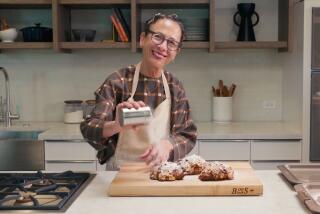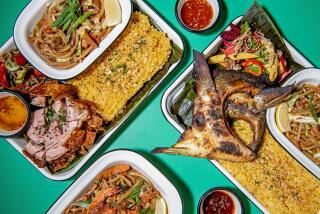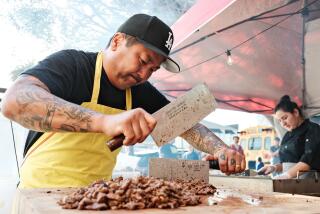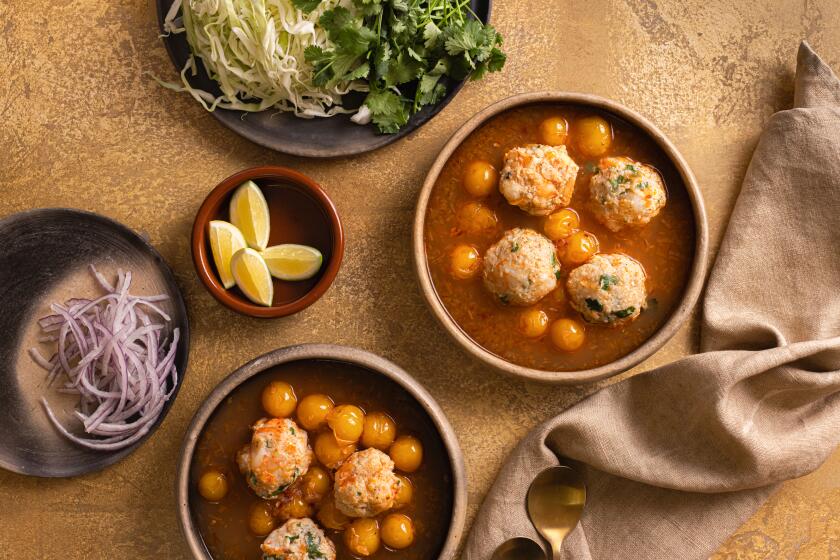Meet the L.A. competitors
With each season of “The Next Food Network Star” the competitors have grown in sophistication.
“The level of competition has increased dramatically,” said Bob Tuschman, Food Network’s vice president for programming and production. “We’ve weeded out people who have much less of a chance, and there’s been much more of a self-selection.”
In Season 1, for example, some competitors became unnerved when asked to “Describe your culinary point of view.” Compare that with the contestants for Season 5, which starts Sunday and is likely to once again be the network’s most popular show.
All three L.A. competitors walk in with made-for-Food-Network-TV story lines:
Debbie Lee, 39, West Hollywood: Her Korean-born parents immigrated to the U.S. in the late 1950s, settling in Mississippi of all places. Korean grocery stories and ingredients were non-existent, so Debbie’s mother learned to cook regional foods such as buttermilk fried chicken, collard greens and gravy. Debbie was born and raised in Arizona on the same cuisine. She was the only Asian girl in her school, and growing up she didn’t really even understand the concept of Asian food, much less Korean specialities such as kim chee. Her family moved to Los Angeles when Debbie was in her early teens, and she was introduced to Korean cooking by her grandmother. Just one problem: Debbie didn’t speak Korean and her grandmother didn’t speak English. She describes their cooking lessons as “quasi-sign language.” Her grandmother would gently slap her hand when she was putting in too much salt, or motion to her when she needed to taste something to see how a dish was progressing. Debbie calls her style of cooking “Seoul to soul,” blending Asian and American cuisines in unexpected ways. Debbie is a restaurant consultant and menu developer in Los Angeles, and is working on opening her own concept restaurant.
Jeffrey Saad, 42, Los Angeles: A graduate of the California Culinary Academy, Saad spent more than 25 years in the restaurant business, launching several himself, including the three Sweet Heat eateries in San Francisco. He later moved into real estate: “Food is the passion, real estate is the income,” he explained. He said he was making dinner one night for a friend: “I was cooking and talking and explaining how I do things,” Saad recalled, “and she said, ‘You should be on Food Network!’ It was an epiphany. You mean I could make a living without owning my own restaurant? I said to myself, ‘I’m going to find a way onto the Food Network, this is what I was meant to do.’ ” He said the challenges are much harder than they appear on TV, and the pressure can be crushing. On Day 1, Saad said, “I thought there would be an orientation, we’d sit down and meet each other, but no. The plane lands, we get out, it’s like ‘Welcome, here’s your challenge.’ I was like ‘I’m barely off the plane!’ That really set the tone for what the show was going to be about.” Still, he said, “The single hardest thing was just really looking deep within yourself and bringing it all, and being who you are.” His culinary point of view? “Cooking without borders. I taste and try and incorporate everything. ... I capture the diversity and flavors of the world.” He said the secret is spice selection: “You don’t have to cook Moroccan to taste Morocco.”
Eddie Gilbert, 30, Los Angeles: He was a hard-charging recruiter who spent his day hiring ambitious assistants for the demanding talent agents at the William Morris Agency. “Thirty times a day I would ask people, ‘What do you really want to do?’ ” he recalled. “It’s amazing that you can forget to ask yourself that same question.” He said he woke up one morning, quit his job and spent a summer driving aimlessly across the U.S., trying to figure out his next move. One morning, he was making croque madames in a campfire skillet while watching the sun rise in the Moab Desert, when it came to him: “I decided I wanted to cook.” He returned home and checked out culinary schools, though at one point he investigated going to law school so he would have a “real” career. Then he decided to just get a job -- in a kitchen. “I believe if you are going to be a chef, you need to be in the kitchen, it’s the best place to learn, and it’s the only place to learn.” He currently works as a line cook at several L.A. area kitchens and is launching a new business at www.foods4dudes.com. He describes his style of cooking as California comfort food.
More to Read
Eat your way across L.A.
Get our weekly Tasting Notes newsletter for reviews, news and more.
You may occasionally receive promotional content from the Los Angeles Times.







